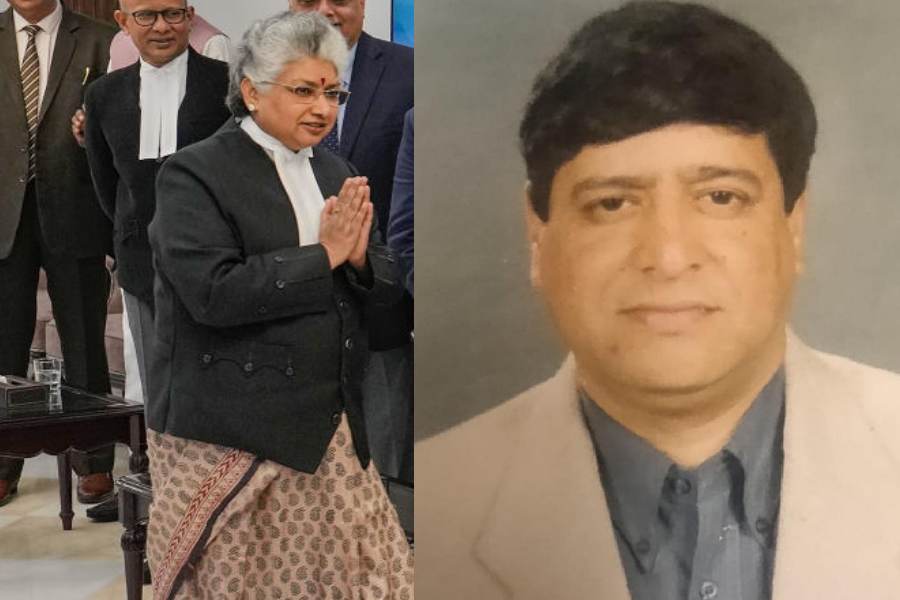Justice B.V. Nagarathna and Justice Sudhanshu Dhulia of the Supreme Court on Tuesday strongly disapproved of the remarks of Chief Justice of India D.Y. Chandrachud that were critical of two former judges.
While Justice Nagarathna called the CJI’s comments “unwarranted and unjustified”, Justice Dhulia expressed “strong disapproval” of the “harsh criticism” of Justice V.R. Krishna Iyer and Justice O. Chinnappa Reddy and said the remarks could have been avoided.
Justice Chandrachud, while heading a bench that ruled that the government has no absolute right to nationalise all private properties, referred to the verdicts in the Ranganatha Reddy vs State of Karnataka case (1977), which was heard by a bench that Justice Iyer was part of, and the subsequent Sanjeev Coke vs Bharat Coke case (1982), heard by a bench that had Justice Reddy.
CJI Chandrachud appeared to suggest that the two judges had supported a “rigid economic theory”, and that their perceived socialist and Marxist views were restrictive and aimed at undermining the Constitution by doing a “disservice” to its broad and flexible spirit. He also observed that the language of Article 39(b) “cannot be restricted to a ‘Marxist reading’ of the Constitution”.
In their minority opinion, Justice Reddy and Justice Iyer had held that the government had an unfettered right to take over private properties in the larger public interest.
On Tuesday while authoring the main judgment on behalf of himself and six other judges, CJI Chandrachud referred to Justice Reddy’s support for the socialist view when the judge had said “Article 39(b) echoed the familiar language and philosophy of socials as expounded by all socialist writers”. The Article is related to the ownership and control of material resources.
Justice Chandrachud said: “In essence, the interpretation of Article 39(b) adopted in these judgments is rooted in a particular economic ideology and the belief that an economic structure which prioritises the acquisition of private property by the state is beneficial for the nation.
“The Constitution and the Directive Principles, as he (B.R. Ambedkar) expounded their fundamental principles, rejected the prevalence of one dogma. The Constitution was framed in broad terms to allow succeeding governments to experiment with and adopt a structure for economic governance which would subserve the policies for which it owes accountability to the electorate.
“The doctrinal error in the Krishna Iyer approach was postulating a rigid economic theory, which advocates for greater state control over private resources, as the exclusive basis for constitutional governance.”
Justice Chandrachud added: “...As participants in a vibrant multi-party ‘economic democracy’, the ‘People of India’ have voted to power governments which have adopted varied economic and social policies, based on the country’s evolving development priorities and challenges.
“The foresighted vision of our framers to establish an ‘economic democracy’ and trust the wisdom of the elected government has been the backbone of the high growth rate of India’s economy.... To scuttle this constitutional vision by imposing a single economic theory, which views the acquisition of private property by the state as the ultimate goal, would undermine the very fabric and principles of our constitutionalframework.”
Justice Nagarathna, who concurred with the majority view on the interpretation of Article 39(B), authored a separate judgment in which she objected to CJI Chandrachud’s remarks. Both Justice Nagarathna and Justice Dhulia felt that the earlier judgments were set in a different era when economic policies had not undergone aparadigm shift.
“The observation of the learned Chief Justice (is) that the interpretation given by Krishna Iyer... and Chinappa Reddy endorse a particular economic ideology and structure for our economy. That in substance the authors of those judgments... were influenced by a particular school of economic thought which prioritised the acquisition of private properties by the State being beneficial for the nation,”she wrote.
Justice Nagarathna added: “It has been observed by the learned Chief Justice that ‘the doctrinal error in the Krishna Iyer approach was postulating a rigid economic theory which advocates for greater state control over private resources as the exclusive basis for constitutional governance. … a single economic theory, which views the acquisition of private property by the state as the ultimate goal, would undermine the very fabric and principles of our constitutional framework’. The above comments on Krishna Iyer... are in my opinion unwarrantedand unjustified.”
She said: “It is a matter of concern as to how the judicial brethren of posterity view the judgments of the brethren of the past, possibly by losing sight of the times in which the latter discharged their duties and the socio-economic policies that were pursued by the State and formed part of the constitutional culture during those times.”
“Merely because of the paradigm shift in the economic policies of the State to globalisation and liberalisation and privatisation, compendiously called the ‘Reforms of 1991’, which continue to do so till date, cannot result in branding the judges of this Court of the yesteryears ‘as doing a disservice to the Constitution’,” JusticeNagarathna said.
“I do not concur with the observations of the learned Chief Justice in the proposed judgment,” she added.
Justice Dhulia, who authored a separate judgment while dissenting with the majority view, said: “Before I conclude, I must also record here my strong disapproval of the remarks made on the Krishna Iyer Doctrine as it is called. This criticism is harsh and could have been avoided. The Krishna Iyer Doctrine, or for that matter the O. Chinnappa Reddy Doctrine, is familiar to all who have anything to do with law or life.
“It is based on strong humanist principles of fairness and equity.... The long body of their judgment is not just a reflection of their perspicacious intellect but more importantly of their empathy forthe people...”











